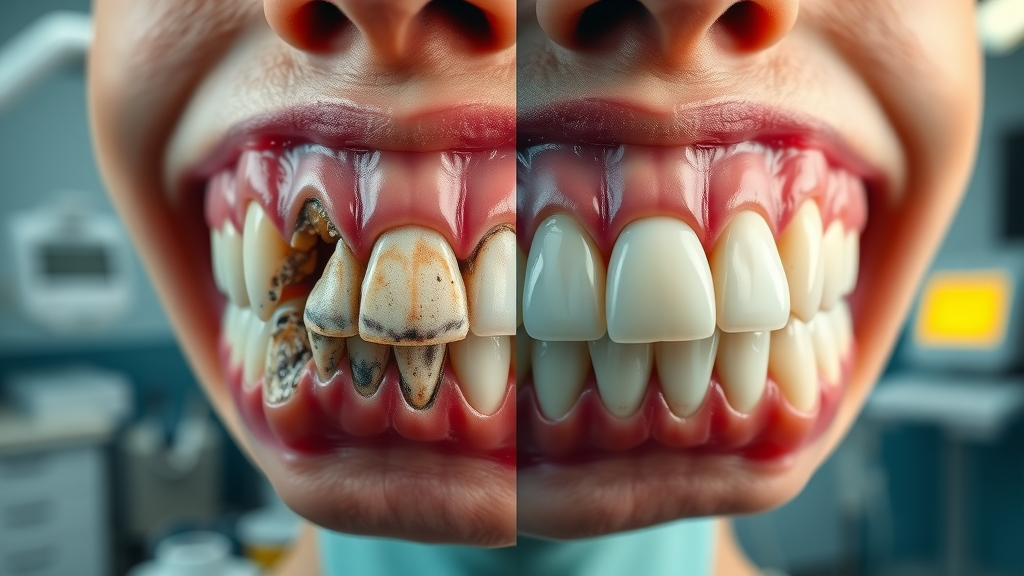Did you know that about 85% of adults eventually need to have their wisdom teeth removed ? This article explores the topic of wisdom teeth removal symptoms , providing you with essential insights into what to expect, complications, and recovery strategies for a smooth experience.
The Necessity of Wisdom Teeth Removal
Why Wisdom Teeth Need to be Removed
Wisdom teeth, or third molars, commonly emerge during late adolescence. Often, there is insufficient space in the mouth to accommodate these extra teeth, which may cause crowding or misalignment. In many cases, your oral health professional may recommend removing wisdom teeth preemptively to avoid future complications such as infection or discomfort. For more information on tooth extractions, visit our Tooth Extractions page .
Possible Complications if Not Removed
Neglecting to remove problematic wisdom teeth can lead to several issues. For instance, impacted wisdom teeth are prone to trapping food and bacteria, increasing the risk of tooth decay and gum disease. Furthermore, there’s also a potential for developing painful cysts or abscesses , which can damage the jawbone and adjacent teeth.
Common Wisdom Teeth Removal Symptoms
Pain and Swelling
After wisdom teeth removal , one of the most prevalent symptoms is pain and swelling around the affected area. This discomfort can typically last for a few days as the body begins its healing process. Managing this pain with prescribed medications and home remedies is crucial to a comfortable recovery.

Bleeding and Bruising
It’s normal to experience mild bleeding and bruising following tooth extraction . This is your body’s natural response to surgery, and it usually subsides within 24 to 48 hours. Applying gentle pressure with gauze and using warm salt water rinses can help control bleeding.
Signs of Dry Socket
A dry socket occurs when the blood clot at the extraction site fails to form correctly or becomes dislodged. This condition can lead to severe pain as the underlying bone and nerves become exposed. If you suspect a dry socket, it's critical to contact your dental care provider immediately for treatment. For immediate actions in dental emergencies, refer to our guide on dental emergencies .
Potential Side Effects
The procedure can occasionally lead to side effects like jaw stiffness and temporary nerve damage. It's important to follow post-operative instructions carefully to minimize these risks and promote healing.
What to Expect After Wisdom Teeth Extraction
Immediate Post-Operative Care
Post-surgery, it's essential to adhere to the dental surgery care plan provided by your oral surgeon. This includes using ice packs to manage swelling and taking prescribed medications. Maintaining a soft diet initially also plays a vital role in your recovery.

Day-by-Day Recovery Timeline
The initial recovery from wisdom teeth extraction involves different stages. Within the first few days, focus on resting and managing pain. Around the three-day mark, discomfort should begin to decrease. By one week, mild activities can typically be resumed, though complete healing may take several weeks.
Recovery Time for Wisdom Teeth Removal
Recovery time for wisdom tooth removal varies between individuals but generally spans from one to two weeks. Adhering to proper oral hygiene practices and attending follow-up appointments are vital to ensure optimal healing and avoid complications like infection .
Understanding the Role of the Oral Surgeon
Choosing the Right Oral Surgeon
Selecting a qualified oral surgeon is crucial for a successful tooth extraction . Factors to consider include their expertise, experience, and how comfortable you feel discussing your concerns with them. A reliable surgeon will make you feel at ease and provide thorough pre- and post-operative guidance.
Managing Wisdom Teeth Removal Symptoms Effectively
Pain Management Strategies
Effective pain management is integral to a smooth recovery. This often involves prescribed pain medication , and alternative techniques like using cold compresses and avoiding hard foods. It’s important to follow the regimen provided by your oral care specialist to minimize discomfort.
Dietary Considerations Post-Surgery
After surgery, adopting a recovery-friendly diet is vital. This includes consuming soft foods such as mashed potatoes, yogurt, and applesauce, which are gentle on the healing gums. Avoiding crunchy or spicy foods reduces the risk of irritating the surgical site.

When to Seek Professional Help
If you experience persistent pain or swelling , signs of infection, or suspect a dry socket, seek professional help promptly. Early intervention can prevent more severe complications and facilitate a quicker recovery.
People Also Ask
What are common symptoms after wisdom teeth removal?
Common symptoms post-removal include pain, swelling , and mild bleeding. It's also common to experience bruising and minor jaw stiffness, which typically improve within a few days following the procedure.
What is the side effect of removing wisdom teeth?
Possible side effects include temporary nerve impairment, sinus issues, or dry socket . Following post-operative care instructions closely minimizes these risks significantly.
How many days to recover from wisdom tooth extraction?
Recovery from wisdom teeth extraction generally takes one to two weeks. Most individuals resume normal daily activities within three to four days, but complete healing of the area may take longer.
What to expect on day 2 after wisdom teeth removal?
On the second day post-extraction, you can expect reduced pain and swelling. Continuing to follow pain management strategies and maintaining proper hygiene aids recuperation.
“ Consult with your dentist to ensure you have all the information needed for a swift recovery.”
|
Potential Symptoms |
Description |
|---|---|
|
Pain and Swelling |
Temporary discomfort and swelling around the extraction site |
|
Bleeding |
Mild bleeding often occurs right after surgery |
|
Dry Socket |
A painful condition when a blood clot dislodges prematurely |
Final Thoughts on Wisdom Teeth Removal Symptoms
Preparation and Effective Recovery Strategies
Being well-prepared for wisdom teeth extraction involves understanding potential symptoms and having a clear recovery plan. Following your dentist’s guidance and maintaining good oral hygiene are key elements of a successful recovery process.
Reassurance and Long-term Oral Health
While the prospect of teeth removal might seem daunting, proper care and professional support ensure a positive outcome. Regular dental check-ups and a commitment to oral health will minimize future dental issues. For more dental care resources, visit our Dental Care Resources page .
Connect with Johnstown Dental Care for Expert Guidance
For professional and personalized dental care, schedule a consultation at Johnstown Dental Care. Our team is dedicated to providing thorough guidance and support throughout your wisdom teeth journey.
"Wisdom teeth can cause more trouble than they are worth, but with the right care, recovery can be quick and painless."
Johnstown Dental Care
370 West Coshocton St.
Johnstown, OH 43031
Phone: (470) 967-6046
Website: www.johnstowndentalcare.com
Proudly Serving: Johnstown, New Albany, Granville, Alexandria, Pataskala, and surrounding areas in Licking County, Franklin County, and Delaware County.
 Add Row
Add Row  Add
Add 




Write A Comment